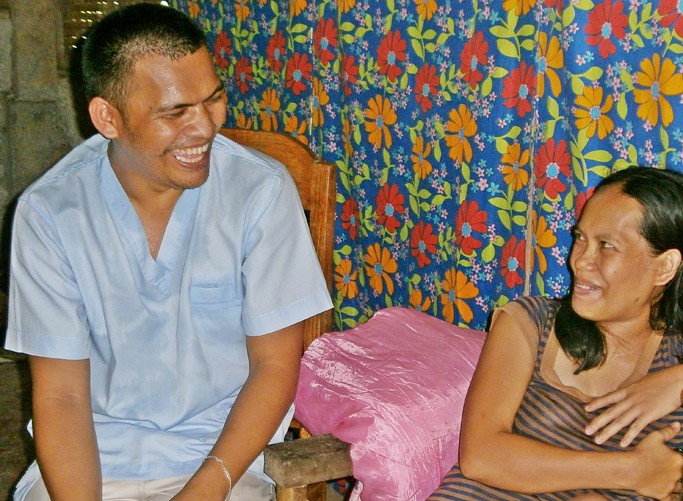
March 2015—In a field dominated by women, Jacinto “Ancing” Managbanag, 31, is among the 1 percent of male midwives in the Philippines, where about 11 women die every day during childbirth. He is one of the nearly 750 private practicing midwives that USAID trained there in maternal and child health between 2009 and 2013.
When women seek medical care throughout their pregnancy, both mother and baby are more likely to survive the birth. Through its Private Sector Mobilization for Family Health Project–Phase 2 (PRISM2), USAID helped the Department of Health and local government engage partners and mobilize resources to deliver maternal and child health services. Midwives like Managbanag have rallied around the cause to get more women into clinics and to provide better care once they get there.
Managbanag attends to around 20 women per month for pregnancy tests, prenatal check-ups, childbirth, postpartum care and reproductive health. His wife, Marie Rose, is also a midwife and works by his side at their clinic.
While he performs an average of eight normal deliveries monthly, Managbanag refers high-risk cases to nearby hospitals. He personally accompanies these women until delivery, not leaving their bedside until he sees that mother and baby are safe. In adherence to Department of Health protocol, Managbanag checks on them within 48 hours after delivery, sometimes defying distance to visit them in faraway villages.
“Some mountainous areas are accessible only by foot,” he says. “Sometimes I take the habal-habal [rented motorbike] as far as it can go and walk the rest of the way.” He reports that the trip can last hours.
“Ancing has my full trust in the delivery room,” says 30-year-old Maria Elena Integro. “He was with me when I delivered my first baby, and he will help me with my second and, hopefully, last.”
While this project, operating in 36 areas across the Philippines, helps parents like Integro raise healthy families, it also benefits midwives by facilitating clinic accreditation through PhilHealth, the national insurance program. Before this assistance, Managbanag could charge $47 (2,000 Philippine pesos) per delivery. He often waived this fee for the very poor and personally absorbed the cost.
Today, Managbanag is reimbursed $188 (PHP 8,000) for each delivery by PhilHealth, which covers total expenses from prenatal to postpartum care of PhilHealth members. The extra income helps him sustain his operations and serve more mothers.
Messages about healthy pregnancies and deliveries are reaching mothers and saving lives. In the past five years, there has been an 11 percent increase in deliveries assisted by skilled birth attendants and a 16 percent increase in facility-based deliveries.
USAID partners with the Philippine Government to support a vision of healthy and productive Filipino families. When vulnerable mothers can access quality health care and give birth with assistance from a skilled attendant, they are more likely to survive their pregnancy, raise stable families, build livelihoods and be more resilient to life’s trials. It is through the efforts of midwives like Managbanag, multiplied many times over across the nation, that Filipinos can contribute to a more stable, prosperous nation.
“My priority is still and has always been to ensure the health of mothers and their babies,” says Managbanag.
USAID's PRISM2 project ran from 2009 to 2014.
LINKS
Follow @USAID_Manila, on Facebook, on Flickr, on YouTube







Comment
Make a general inquiry or suggest an improvement.